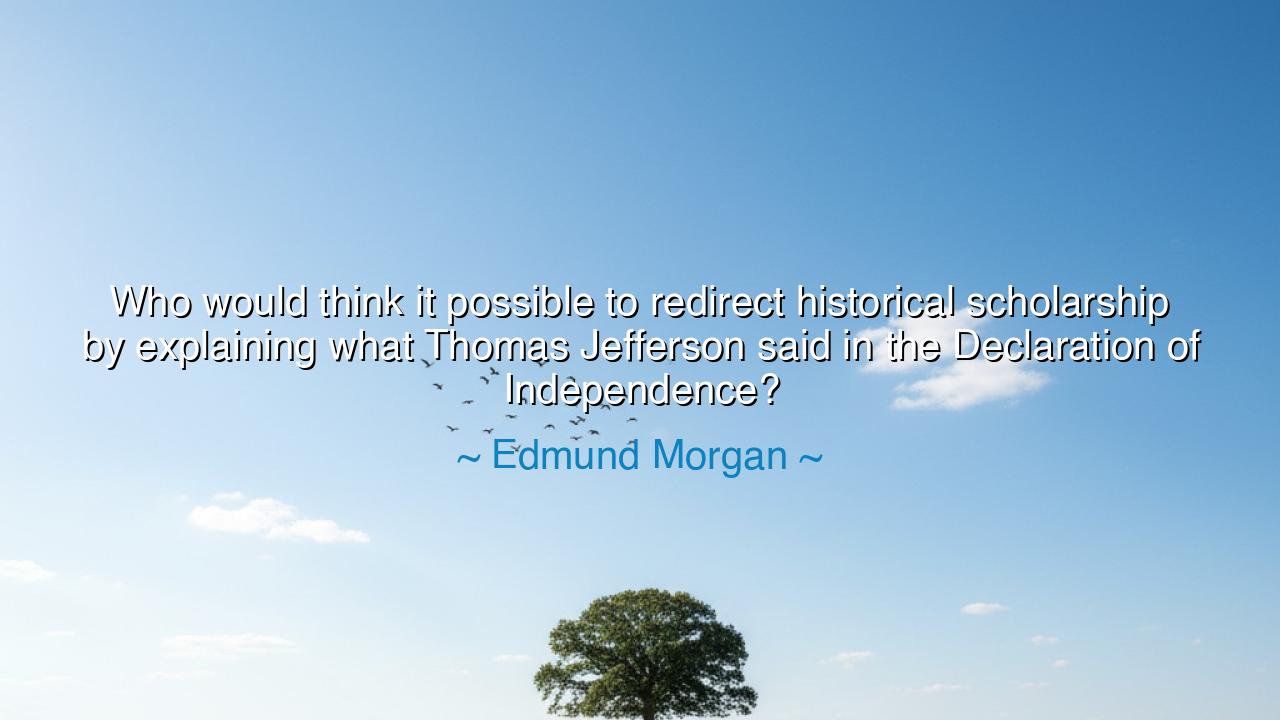
Who would think it possible to redirect historical scholarship by
Who would think it possible to redirect historical scholarship by explaining what Thomas Jefferson said in the Declaration of Independence?






There are moments in history when the simplest truths — long overlooked, long taken for granted — return to shake the foundations of understanding. When Edmund Morgan asked, “Who would think it possible to redirect historical scholarship by explaining what Thomas Jefferson said in the Declaration of Independence?” he was not expressing disbelief in Jefferson’s greatness, but wonder at the power of clarity — that to truly understand the obvious is sometimes the most revolutionary act of all. For the words of the Declaration of Independence, though read by millions and enshrined in the hearts of patriots, had become dulled by repetition. And Morgan, a historian of piercing insight, saw that by reexamining what was already known, one could breathe new life into history itself.
The Declaration, that sacred text of liberty, had become in many ways a relic of ritual — revered but rarely read with the soul. Yet within its phrases lies the heartbeat of a people awakening to their own dignity: “All men are created equal.” “They are endowed by their Creator with certain unalienable rights.” “Among these are life, liberty, and the pursuit of happiness.” These words, once a spark of revolution, had become polished into slogans. Morgan’s question challenges us to look deeper — to see the living fire behind familiar words, to rediscover meaning where the world sees only form.
The wonder in his question lies in its humility. It suggests that history does not always advance by uncovering new facts, but by understanding old truths anew. It was not Jefferson’s handwriting that changed the world, but the spirit that animated his words — the conviction that freedom was not a gift from kings, but the birthright of all men. To explain that truth, to awaken again the sense of what it meant, was to redirect the flow of thought, to remind scholars and citizens alike that the past is not dead parchment, but a mirror for the living.
We find echoes of this same revelation throughout the ages. When Martin Luther nailed his theses to the church door in Wittenberg, he did not invent faith, repentance, or Scripture — he merely reminded the world of what had always been written, yet forgotten. When Confucius spoke of virtue and harmony, he did not create morality anew — he rekindled the light of ancient wisdom, dimmed by neglect. So too did Morgan, in his own scholarly way, remind us that the meaning of freedom, equality, and self-governance cannot be preserved by memorization, only by continual rediscovery.
Morgan’s insight also carries a deeper lesson about the nature of truth itself. We often chase the new, believing that progress must always lie ahead, not behind. Yet the ancients knew that wisdom is circular, not linear. The same sun that rises has risen before; the same truth, once forgotten, must be found again by each generation. Thus, to “redirect historical scholarship” through Jefferson’s words was not regression — it was renewal. It was the act of drawing from the deep well of the past to quench the thirst of the present.
And what does this mean for us? It means that we, too, must never grow numb to the great declarations of our age — whether of freedom, of justice, or of human dignity. We must read them again and again, not as documents, but as living testaments to what we still struggle to achieve. For the ideals Jefferson penned are not yet fully born; they remain promises to be realized in each life, each generation. To understand them truly is to participate in the ongoing revolution of the human spirit.
Therefore, my child, learn from Morgan’s wonder. Do not seek wisdom only in the hidden or the complex, but also in the familiar made sacred. Read deeply what others read lightly. Ask what others assume. And when you find yourself weary of grand discoveries, return to the foundations — for it is there, in the simple, eternal words of freedom and equality, that the destiny of humankind continues to be written. For as Morgan taught us, to rediscover what is known is often the greatest act of enlightenment.






AAdministratorAdministrator
Welcome, honored guests. Please leave a comment, we will respond soon